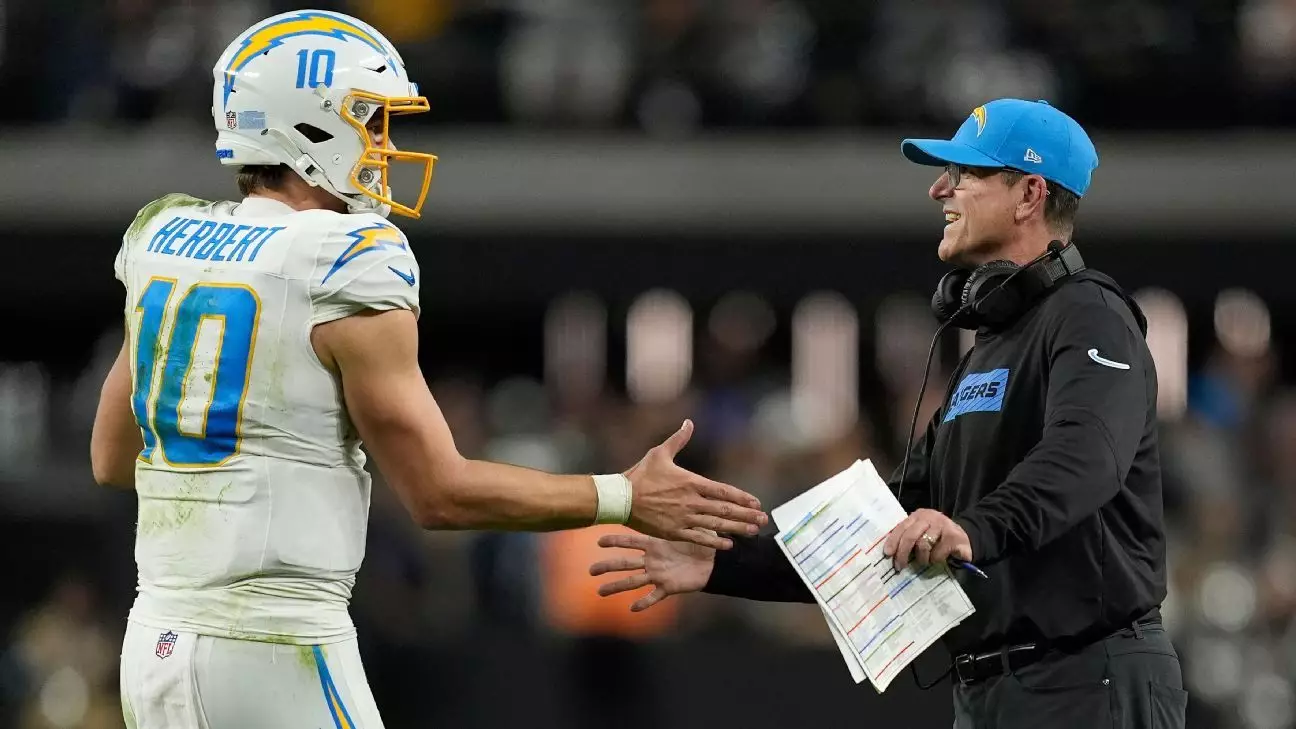The Los Angeles Chargers faced heartbreak after a dismal playoff performance against the Houston Texans, with quarterback Justin Herbert at the center of the storm. The 32-12 defeat revealed significant struggles in Herbert’s game, overshadowing his otherwise brilliant regular season performance. An analysis of this poignant moment provides insights not just into Herbert’s capabilities, but also into the dynamics of coaching and player performance under pressure.
As the Chargers entered their wild-card matchup, Herbert was riding a wave of confidence. He’d secured the fewest interceptions in the league during the regular season, hinting at a promising quarterbacking future. However, the playoff stage proved daunting, as Herbert’s performance spiraled downwards with four interceptions — a stark contrast to his regular-season statistics. This dramatic shift raises questions: Was it a failure on Herbert’s part, or was the coaching staff unable to provide him with the necessary tools to succeed?
In the run-up to the game, the atmosphere was ripe with expectation. The Chargers had shown signs of promise, and Herbert was viewed not just as a strong competitor but a rising star in the NFL. Expectations were high; thus, when things began to unravel, both fans and analysts were left reeling. The pivotal moments of the game included errant throws and critical mistakes that would haunt Herbert as he finished the match with a dismal 14-of-32 pass completion rate — ranking among the worst for a Chargers quarterback in playoff history.
Following the loss, Coach Jim Harbaugh’s comments added fuel to the analysis. He openly accepted responsibility for the team’s performance, stating they had “done [Herbert] a disservice.” Harbaugh’s reflection on the inadequacies of the game plan suggests a deeper issue within the coaching dynamics, as well as a disconnect between preparation and execution. In a setting as high-stakes as the playoffs, the pressure is immense, and the coach’s role in shaping a player’s success cannot be overstated.
Herbert faced immense pressure during the game, being sacked four times and pressured on half of his dropbacks. This statistic alone signifies lapses in the offensive line’s performance, illustrating that even the most talented quarterbacks can struggle when not adequately supported. Thus, the game provides a cautionary tale about how critical coaching strategies and player support systems are to success.
The criticism that has followed Herbert since this playoff loss points to a broader issue regarding expectations placed on young quarterbacks. The narrative that is emerging—of Herbert as a postseason underperformer—emphasizes the harsh realities of the NFL, where every player is scrutinized under a magnifying glass. This scrutiny can sometimes overshadow even moments of extraordinary talent and skill, generating a narrative that is rarely fair.
Notably, GM Joe Hortiz defended his quarterback, drawing parallels to the early playoff struggles of greats like Peyton Manning and Lamar Jackson. Such comparisons are crucial for perspective; they remind fans and analysts alike that historical context matters in assessing a player’s trajectory. Herbert’s early playoff record, while disappointing, does not solely define his potential. What should be examined is how he responds to adversity moving forward.
As the Chargers aim to recalibrate after a difficult postseason exit, all eyes will be on how they structure their offense going forward to maximize Herbert’s talents. The lessons learned from the missteps during the Houston game could become stepping stones for future benefit. There is a silver lining: Herbert’s admission of responsibility shows his maturity and ability to take accountability—a hallmark of great leaders.
While Justin Herbert’s playoff performance has drawn criticism, it is paramount to recognize the multifaceted nature of sports and the constellation of factors that contribute to a player’s success or failure. As he continues to grow and evolve in his role, both the coaching staff and management have a significant opportunity to rally around their young star and provide him with the necessary support system to thrive. The Chargers must learn from this loss, re-evaluate their strategies, and come back stronger—not just for Herbert’s sake, but for the future of the team as a whole.

